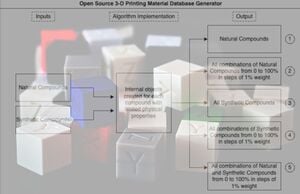
Abstract Purpose: This study aims to apply an open-source approach to protect the 3D printing industry from innovation stagnation due to broad patenting of obvious materials.
Design/methodology/approach:To do this, first an open-source implementation of the first five conditions of an open-source algorithm developed to identify all obvious 3-D printing materials was implemented in Python, and the compound combinations of two and three constituents were tested on ten natural and synthetic compounds. The time complexity for combinations composed of two constituents and three constituents is determined to be O(n2) and O(n3), respectively.
Findings: Generating all combinations of materials available on the Chemical Abstracts Services (CAS) registry on the fastest processor on the market will require at least 73.9 h for the latter, but as the number of constituents increases the time needed becomes prohibitive (e.g. 3 constituents is 1.65 million years). To demonstrate how machine learning (ML) could help prioritize both theoretical as well as experimental efforts a three-part biomaterial consisting of water, agar and glycerin was used as a case study. A decision tree model is trained with the experimental data and is used to fill in missing physical properties, including Young's modulus and yield strength, with 84.9 and 85.1% accuracy, respectively.
Originality/value:The results are promising for an open-source system that can theoretically generate all possible combinations of materials for 3-D printing that can then be used to identify suitable printing material for specific business cases based on desired material properties.
Source[edit | edit source]
- Dheeraj Choppara, Alysia Garmulewicz, Joshua Pearce. Open-Source 3-D Printing Materials Database Generator. Journal of Manufacturing Technology Management, Vol. 34 No. 6, pp. 1051-1069, 2023. https://doi.org/10.1108/JMTM-01-2023-0010 Academia OA
- Code availability - All software is released under the GNU GPL v3 license and is held at a permanent repository for this article in the Open Science Framework (https://osf.io/wcahx/ ) and a live version is available on Github (https://github.com/dchoppara/3-D-Printing-Materials-Generator/tree/main).
Keywords[edit | edit source]
3D printing, additive manufacturing, materials database, open source, prior art, big data, Intellectual property; Open hardware; Automation; data management; knowledge; data management practices; open source software; free software; knowledge mobilization, Open Source, Open Source Hardware, Innovation, free and open source hardware; FOSH; free and open source software; open design; open hardware; open science; open scientific hardware; OScH; communication studies, communication, information technology, information science, libraries, science, knowledge, technology, sociology
See also[edit | edit source]
- A novel approach to obviousness: An algorithm for identifying prior art concerning 3-D printing materials
- Expanding the Consumer Bill of Rights for material ingredients
- Open-source nanotechnology: solutions to a modern intellectual property tragedy
- Open source nanotechnology
- Open Source Database and Website to Provide Free and Open Access to Inactive U.S. Patents in the Public Domain
- A Case for Weakening Patent Rights
- The Rise of Platinum Open Access Journals with both Impact Factors and Zero Article Processing Charges
- From Open Access to Open Science: The Path From Scientific Reality to Open Scientific Communication
- Professors Want to Share: Preliminary Survey Results on Establishing Open Source Endowed Professorships
- Canadian professors' views on establishing open source endowed professorships
- Sponsored Libre Research Agreements to Create Free and Open Source Software and Hardware
- Towards national policy for open source hardware research: The case of Finland
- Open Source Lab
- Quantifying the Value of Open Source Hardware Development
- Building Open Source Hardware in Academia
- Building research equipment with free, open-source hardware
- Economic Savings for Scientific Free and Open Source Technology: A Review
- Free and Open-Source Automated Open Access Preprint Harvesting
- Appropedia:OSHWA Certification tool design




